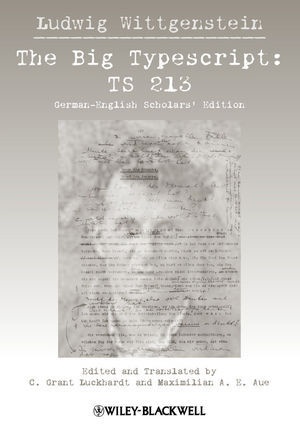En savoir plus
Informationen zum Autor C. Grant Luckhardt is Professor Emeritus of Philosophy at Georgia State University, where he was a member of the Philosophy Department and for many years the Director of the Honors Program. His research interests are in Wittgenstein and in Native American Thought and Culture. Maximillian E. Aue is Chair and Associate Professor of German Studies at Emory University. His publications include translations of the following works by Wittgenstein: Remarks on the Philosophy of Psychology , vol. II (1980), Last Writings on the Philosophy of Psychology , vol. I (1982), and Last Writings on the Philosophy of Psychology , vol. II (1992). Klappentext Long awaited by the scholarly community, Wittgenstein's so-called Big Typescript (von Wright Catalog # TS 213) is presented here in an en face English-German scholar's edition.* Presents scholar's edition of important material from 1933, Wittgenstein's first efforts to set out his new thoughts after the publication of the Tractatus Logico Philosophicus* Includes indications to help the reader identify Wittgenstein's numerous corrections, additions, deletions, alternative words and phrasings, suggestions for moves within the text, and marginal comments Zusammenfassung Long awaited by the scholarly community, Wittgenstein s so-called Big Typescript (von Wright Catalog no. TS 213) is presented here for the first time in an en-face German English scholars edition, complete with clear indications to help the reader identify the various levels of Wittgenstein s editing. Inhaltsverzeichnis Verstehen 1 1 Das Verstehen, die Meinung, fällt aus unsrer Betrachtung heraus 2 2 "Meinen" amorph gebraucht. "Meinen" mehrdeutig 5 3 Das Verstehen als Korrelat einer Erklärung 8 4 Das Verstehen des Befehls, die Bedingung dafür, daß wir ihn befolgen können. Das Verstehen des Satzes, die Bedingung dafür, daß wir uns nach ihm richten 12 5 Deuten. Deuten wir jedes Zeichen? 16 6 Man sagt: ein Wort verstehen heißt, wissen, wie es gebraucht wird. Was heißt es, das zu wissen? Dieses Wissen haben wir sozusagen im Vorrat 18 6a Einen Satz im Ernst oder Spaß meinen, etc. 21 Bedeutung 22 7 Der Begriff der Bedeutung stammt aus einer primitiven philosophischen Auffassung der Sprache her 23 8 Bedeutung, der Ort des Wortes im grammatischen Raum 26 9 Die Bedeutung eines Wortes ist das, was die Erklärung der Bedeutung erklärt 29 10 "Die Bedeutung eines Zeichens ist durch seine Wirkung (die Assoziationen, die es auslöst, etc.) gegeben." 33 11 Bedeutung als Gefühl, hinter dem Wort stehend; durch eine Geste ausgedrückt 37 12 Man tritt mit der hinweisenden Erklärung der Zeichen nicht aus der Sprachlehre heraus 38 13 "Primäre und sekundäre Zeichen". Wort und Muster. Hinweisende Definition 40 14 Das, was die Philosophie am Zeichen interessiert, die Bedeutung, die für sie maßgebend ist, ist das, was in der Grammatik des Zeichens niedergelegt ist 48 Satz. Sinn des Satzes 49 15 "Satz" und "Sprache" verschwimmende Begriffe 50 16 Die Logik redet von Sätzen und Wörtern im gewöhnlichen Sinn, nicht von Sätzen und Wörtern in irgend einem abstrakten Sinn 57 17 Satz und Satzklang 59 ...
Table des matières
Verstehen. 1 Bedeutung. 22 Satz. Sinn des Satzes. 49 Understanding. 1
Meaning. 22
Proposition. Sense of a Proposition. 49
Das augenblickliche Verstehn und die Anwendung des Worts in der Zeit. 109
Immediate Understanding and the Application of a Word in Time. 109
Wesen der Sprache. 128
Gedanke. Denken. 164
Grammatik. 183
The Nature of Language. 128
Thought. Thinking. 164
Grammar. 183
Intention und Abbildung. 213
Logischer Schluß. 229
Allgemeinheit. 240
Intention and Depiction. 213
Logical Inference. 229
Generality. 240
Erwartung. Wunsch. etc. 263
Philosophie. 299
Phänomenologie. 319
Expectation. Wish. etc. 263
Philosophy. 299
Phenomenology. 319
Idealismus, etc. 346
Grundlagen der Mathematik. 370
Über Kardinalzahlen. 392
Mathematischer Beweis. 417
Idealism, etc. 346
Foundations of Mathematics. 370
On Cardinal Numbers. 392
Mathematical Proof. 417
Induktionsbeweis. Periodizität. 443
Das Unendliche in der Mathematik. Extensive Auffassung. 482
Anhang I 506
Register 507
Inductive Proofs. Periodicity. 443
The Infinite in Mathematics. The Extensional Viewpoint. 482
Appendix I 506
Index 507
Commentaire
Experts used to regard an edition of this much revised typescript as well-nigh impossible. Now they have been proved wrong: Aue and Luckhardt have miraculously succeeded in producing a scrupulously accurate and at the same time highly readable edition and translation of this previously missing link between Wittgenstein's Tractatus and his later writings.
Joachim Schulte, Universität Bielefeld
Here is Wittgenstein's most important unpublished typescript, expertly edited and superbly translated. Required reading for anyone interested in what Wittgenstein wrote after the Tractatus and before the Philosophical Investigations.
David Stern, University of Iowa

